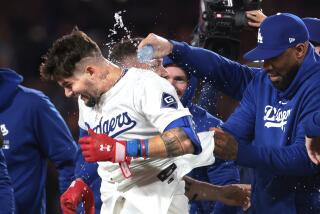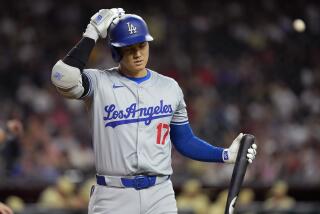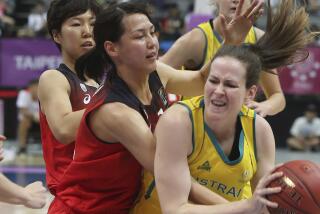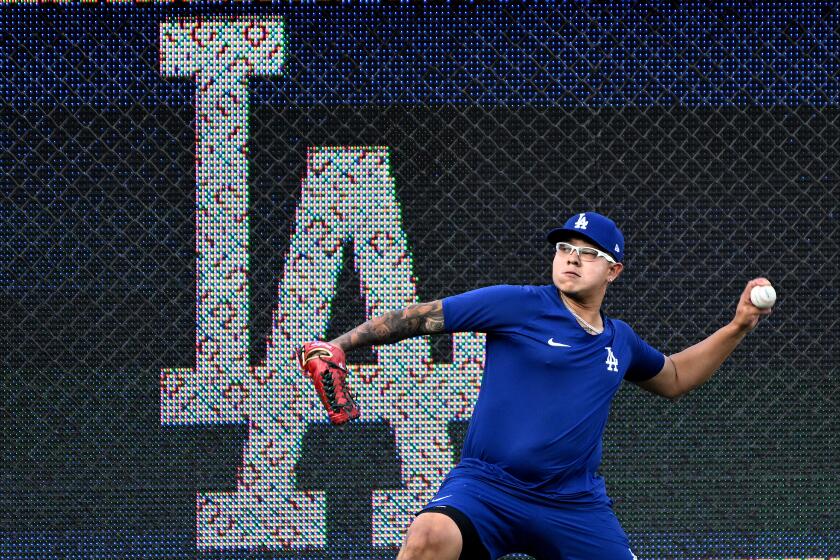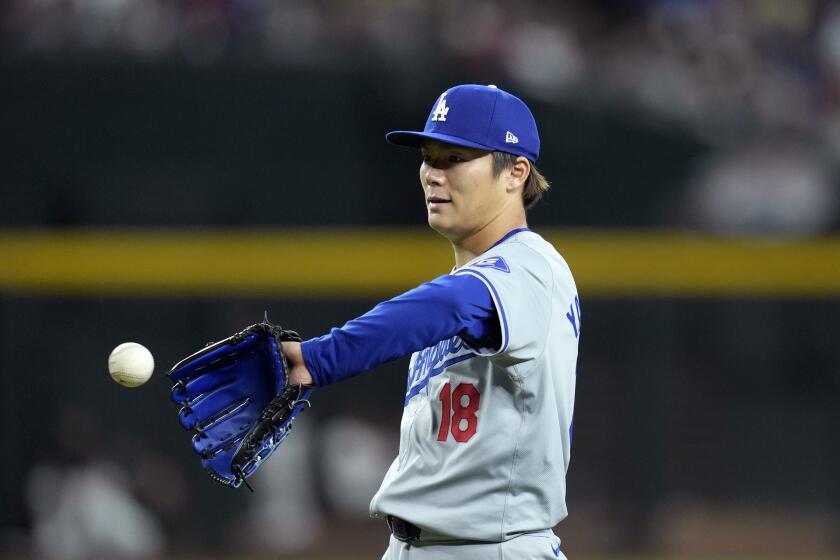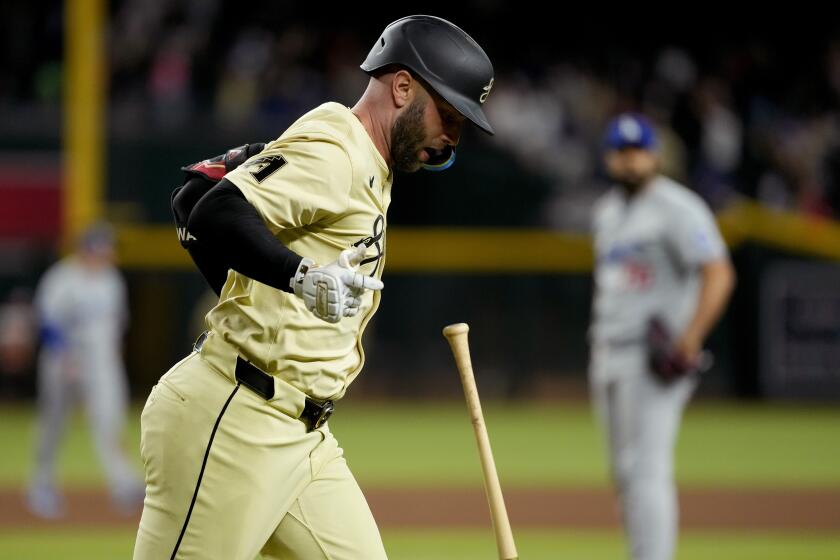50 Years, Still Fears
The Dodgers, considered baseball’s role model in race relations, will have a notable absence tonight when the 50-year anniversary of Jackie Robinson’s first major league game is celebrated during their game with the Mets in New York.
For the first time since Robinson integrated baseball in 1947, the Dodgers have no American-born black players in their everyday lineup or on their pitching staff.
It is the only major league team in baseball with such a distinction.
“If Jackie were alive today and seeing what’s going on, it would just kill him,” said Don Newcombe, former Dodger Cy Young award-winning pitcher, Robinson’s teammate and now the Dodgers’ director of community relations.
“You take a look around and see what’s going on. . . . You don’t see [the Dodgers] getting kids out of Compton or Watts or Carson. . . . But now, if they can go to Seoul, Korea, or Japan or Santo Domingo to get a player, they’ll do it.
“They like to talk about the guy they’ve gotten from Korea, Japan, Mexico, Santo Domingo, but [those players] don’t consider themselves black, you know. And they aren’t black.”
The Dodgers, once considered black America’s team, have only one American black on their roster, reserve outfielder Wayne Kirby, now that infielder Chad Fonville has been sent to the minors. They have not had more than one American black in their everyday lineup since Darryl Strawberry and Eric Davis last played for the Dodgers in 1993.
“I think it has to do more with the cycles of time,” said Fred Claire, Dodger executive vice president. “If anybody says am I uncomfortable with the Dodger present or Dodger history? Absolutely not. I think the Dodger history speaks volumes for itself. I don’t think it’s a matter of going through, intoning numbers. No one in baseball has done [integration] better than the Dodgers. We probably have more different nationalities represented than any team in history. That signals the openness of this organization.
“We’ve always reached out for talent. . . . But we can’t create talent. We can only find the talent that’s available.”
The Dodgers’ scouting efforts have focused primarily on white and Latino players since the inception of the draft in 1965. They have drafted and developed only 21 American black players who have made the big leagues in Dodger uniforms. Lee Lacy and Franklin Stubbs are the only players among them who had more than 1,000 plate appearances with the Dodgers. Ken Howell, who had an 18-29 record, is the only drafted American black pitcher who won more than 10 games as a Dodger.
The most successful black Americans drafted by the Dodgers flourished after leaving the organization.
Pitcher Dave Stewart, who was traded to Texas, became a four-time, 20-game winner for the Oakland Athletics. Tom Goodwin, released in 1994, is now the starting center fielder for the Kansas City Royals, for whom he stole 66 bases last season. Second baseman Eric Young, claimed in the expansion draft, has become one of the National League’s premier leadoff hitters for the Colorado Rockies.
Chris Gwynn is the only black American drafted by the Dodgers since 1985 who played a significant role with the team. He spent parts of seven seasons as a pinch-hitter.
“At some point, someone’s got to take a stand,” Gwynn said. “This isn’t right.”
The trend applies, however, throughout baseball. There is a lower percentage of American blacks in baseball today than in 1959, the year baseball became fully integrated. There were 69 American blacks playing in the 16-team major leagues in 1959--representing 17.25% of all players. Today, there were 108 on the opening-day rosters and disabled lists--15.4%.
“It makes you want to cry,” said Lou Johnson, another former Dodger who works in the team’s community affairs office. “It makes me sick to my damn stomach.
“I get so sick of people around the office saying, ‘Well, black folks don’t come to games, anyway.’
“They’re no fools. They can see that these guys aren’t black. They may be Dominican or Puerto Rican or Japanese or whatever, but they’re not black, I’ll tell you that.”
Said Newcombe: “I remember a friend of mine, about 10-12 years ago, said to me, ‘I’m going to make a heavy statement. In the next 20 years, you’re not going to see many black American ballplayers in the major leagues.’ Damn if he wasn’t right. . . .
“I look at the Dodgers. I work for the Dodgers, and I see what’s going on. The Dodgers have this beautiful university in Santo Domingo. But they don’t have one in Los Angeles.
“I’m not saying this to besmirch [Dodger owner] Peter O’Malley in any way, but it’s time this club develops ballplayers in the United States, instead of some other country.”
The Dodgers have focused much of their scouting attention on Latin America and foreign countries.
They have two players, Raul Mondesi and Wilton Guerrero, in their everyday lineup from the Dominican Republic. Two starting pitchers, Ramon Martinez and Pedro Astacio, are Dominicans. Pitchers Ismael Valdes, Hideo Nomo and Chan Ho Park are from Mexico, Japan and Korea, respectively.
One bench player, Nelson Liriano, is from the Dominican Republic and another, Juan Castro, is from Mexico.
“Maybe the Dodgers figure that all they need to do is get some dark-complexioned players and no one will notice the difference,” said Hal McRae, Philadelphia Phillie hitting coach and former manager of the Kansas City Royals. “I think they feel justified when they have dark skin, so they think it’s the same when they get guys from the Dominican Republic, Puerto Rico or Mexico.
“Maybe that’s the angle they are taking today, is that black means dark. Fans don’t seem to notice. They see guys with dark complexions and figure they have diversity on the field, ‘Hey, they must be OK.’ ”
Considering the Dodgers’ success in the Dominican Republic, why not build an academy in the inner city of Los Angeles?
“Great idea,” O’Malley said. “But for the Dodgers to build an academy in the inner city doesn’t make sense because of the draft. If you developed these players, you could lose them to other teams in the draft. It doesn’t work that way in the Dominican [where players are not subject to the draft].
“It would make sense now for the industry to do that as a whole, but not for one team.”
The Dodgers have three American black department heads: Newcombe; Tommy Hawkins, vice president for communications, and Monique Brandon, director of community affairs.
“I’m extremely proud of the progress we’ve made in the front office,” O’Malley said. “That’s been a concerted effort. It’s happened with a lot of effort.”
The Dodgers, like most teams, have never had a black manager, general manager, scouting director, farm director, traveling secretary, trainer, public relations director or equipment manager.
They have never had an African American in baseball operations.
They have two black Americans among their 53 scouts. Reggie Smith is the lone black coach at the major league level. John Shelby, who was recently demoted to Class-A Savannah, is the only American black among the organization’s 46 minor league managers and coaches.
In comparison, the Cincinnati Reds have an African American assistant general manager, an African American chief financial officer and seven black Americans on the team. The Reds are owned by Marge Schott, who is suspended from baseball for making racist remarks.
“It’s tough to say that the first organization to bring a black man to baseball is racist,” said Stewart, now an assistant to General Manager Kevin Towers of the San Diego Padres.
“But the bottom line is that they have no blacks in baseball operations, and they have no blacks to even move up in the organization. The Dodgers are great at bringing back players to their organization, but heck, how about a guy like me who doesn’t want to coach? Are they saying there’s no place for a guy like me?”
Von Joshua, who was a Dodger minor league coach, spoke publicly about there being no blacks promoted in the organization after Al Campanis was fired 10 years ago as general manager for making racially insensitive remarks on national TV.
Several years later, Joshua was fired.
“There’s a lot of bitter people over there who are afraid to talk,” said Joshua, now the Chicago White Sox’s triple-A hitting instructor. “It makes you wonder what’s going on.
“I’m not there to know first-hand, but all I have to go by is what they tell me over there, and it’s not a pretty picture. I know they ran me out of there when I spoke up.”
The American black players in the game today say that racism isn’t as blatant as it was 20 years ago, but it’s just as intense.
“People don’t want to face the facts, people don’t want to hear the truth,” Gary Sheffield, Florida Marlin all-star right fielder, said. “But we [African American players] know what’s happening out there. No one’s fooling us.
“That’s why you don’t see black managers. If you had black managers, they might hire their black friends as coaches. And if you have black coaches, they might get black players.
“You want to know why there aren’t any black players? Because you’ve got to be twice as good as anyone else. If you’re not, you just won’t make it.”
Discrimination in baseball is widespread, American black players say. They point out the few black pitchers in the game. They ask why white pitchers who don’t throw hard are common, but why a black pitcher is not afforded the same luxury. They ask why there are few blacks on teams’ benches?
“That’s what makes baseball so tough,” Sheffield said. “You see racism every single minute of every day. That’s why when I see black folks in the stands, I’ll make a point of coming over to say hi. It’s nice to see some black folks once in a while. But in Los Angeles, that’s a rarity.”
Stewart agreed with Sheffield.
“We’re not on a dang mission, but there should be equality in baseball,” he said. “The bottom line is that it’s not the same for the black as it is for the white, from the field to the front office. But you’ve got to have players talking about it.
“There’s a guy they have at shortstop in Cincinnati, a guy who could address all of this. Barry Larkin won’t even talk about it. Marge Schott embarrasses him, and he won’t say a word. We’re not asking Barry to crucify her, we’re asking Barry to say how he feels about Marge Schott.
“Is that so hard?”
Said Astro shortstop Pat Listach, former American League rookie of the year: “The trouble is, when you talk about race relations, you can offend some people real quick. You do that, and you’re out of the game. You really have got to watch what you say.
“There’s certain things a black player can’t do or say that a white player can. That’s not a complaint, that’s just a fact. . . .”
Stewart cited what he said was disparity in development as further evidence of racial inequity.
“I never thought it was fair that as a six-year minor league starter I had to come up to the majors [with the Dodgers] and be a reliever,” he said. “Bob Welch came up as a starter. So did Fernando [Valenzuela]. So did Joe Beckwith. And Rick Sutcliffe. I had winning numbers as a starter, but they never gave me a chance. . . .
“It’s really unfortunate that white people, not only in baseball but in society, can’t be black just for one day to see how it really feels.”
The Dodgers, who play in an area comprising 900,000 African Americans, say they will continue their search for home-grown black talent. And only five years ago, their opening-day lineup had only two white players, center fielder Brett Butler and catcher Mike Scioscia. Yet, that 1992 team, with Strawberry and Davis struggling, lost 99 games.
“You hear the talk in the black community that the Dodgers are scared to try it again,” Gwynn said. “I mean, look at my last couple of years there. It was me and Delino [DeShields]. That was it.
“I really hope that wasn’t the end of it.”
Said Claire: “[The failure of Strawberry and Davis] won’t deter us in any way. We’ve had a lot of players that didn’t work out one way or another. We’ve never been afraid to reach for talent, but that talent has to produce.
“Everybody has to do more. We need to do more. Baseball needs to do more. This country needs to do more.”
And perhaps the Dodgers could make the greatest stride in race relations once again 50 years later. With the franchise up for sale, O’Malley could become the first owner to sell his club to an African American business group or black individuals.
“I’d be very proud if that were to happen,” O’Malley said. “Our search for talent is the same as on the field. I won’t count out any person.”
* WHAT PROGRESS?: African-American players in the major leagues say racism continues in baseball. A1
(BEGIN TEXT OF INFOBOX / INFOGRAPHIC)
Jackie Robinson Salute
Dodgers vs. New York Mets
Shea Stadium
Game Time: 4:35 pm.
Highlights: The game, which will be stopped for at least 30 minutes after the Dodges bat in the top of the fifth inning, will be highlighted by President Bill Clinton’s speech. The Mets also plan to name an avenue near Shea Stadium in Robinson’s honor.
More to Read
Are you a true-blue fan?
Get our Dodgers Dugout newsletter for insights, news and much more.
You may occasionally receive promotional content from the Los Angeles Times.
